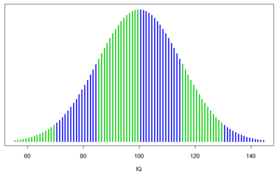The Truth About IQ
"[Some] assert than an individual's intelligence is a fixed quantity which cannot be increased. We must protest and react against this brutal pessimism."
- Alfred Binet, inventor of the original IQ test, 1909
Coming next in this blog: Should kids know their own IQs?
"The tasks featured in the IQ test are decidedly microscopic, are often unrelated to one another, and . . . are remote, in many cases, from everyday life. They rely heavily upon language and upon a person's skill in defining words, in knowing facts about the world, in finding connections (and differences) among verbal concepts . . . . Moreover, the intelligence test reveals little about an indivdual's potential for further growth."[iii]
IQ problems tend to be "clearly defined, come with all the information needed to solve them, have only a single right answer, which can be reached by only a single method, [and are] disembodied from ordinary experience . . . . Practical problems, in contrast, tend to require problem recognition and formulation . . . require information seeking, have various acceptable solutions, be embedded in and require prior everyday experience, and require motivation and personal involvement."[iv]
FOOTNOTES
[UPDATE 8/9/09: MY ORIGINAL FOOTNOTES FOR THIS POST WERE A LITTLE SLOPPY -- RIGHTLY POINTED OUT BY SEVERAL READERS. I'VE ADDED SOME PERTINENT CITATIONS AND REMOVED SOME IRRELEVANT ONES.]
[i] IQ scores do not identify the most successful and creative artists or scientists:
- Delis, D.C., Lansing, A., Houston, W.S., Wetter, S., Han, S.D., & Jacobsen, M., Holdnack, J., & Kramer, J. (2007). Creativity lost: The importance of testing higher-level executive functions in school-aged children. The Journal of Psychoeducational Assessment, 25, 29-40.IQ does not distinguish the best chess players from others: - Doll, J., and U. Mayr, 1987, "Intelligenz und Schachleistung - eine Untersuchung an Schachexperten." [Intelligence and achievement in chess - a study of chess masters]. Psychologische Beiträge, 29: 270-289.
[iii]Howard Gardner, Frames of Mind, 1993, p. 18.
[iv] "Intelligence: Knowns and Unknowns," Report of a Task Force established by the Board of Scientific Affairs of the American Psychological Association, August 7, 1995.
Ceci, S. J. On Intelligence: A bio-ecological treatise on intellectual development. 2nd ed., Harvard University Press. 1996.
Ceci's citations:
Family environment
- Ann M. Clarke, Alan D. Clarke, Early Experience and the Life Path, Somerset, 1976.
- Dagmund Svendsen, Factors Related To Changes In IQ: A Follow-Up Study Of Former Slow Learners, Journal of Child Psychology and Psychiatry, Volume 24 Issue 3, Pages 405 - 413, 1982.
Work environment
- Melvin Kohn and Carmi Schooler, "The Reciprocal Effects of the Substantive Complexity of Work and Intellectual Flexibility: A Longitudinal Assessment" (with Carmi Schooler). 1978. American Journal of Sociology 84 (July): 24-52.
Historical environment
- Flynn, J. R. (1987). Massive IQ gains in 14 nations: What IQ tests really measure. Psychological Bulletin, 101,171-191.
Styles of parenting
- D. Baumrind, "Child care practices anteceding three patterns of preschool behavior," Genetic Psychology Monographs, 75, 43-88, 1967.
- Sanford M. Dornbusch, Philip L. Ritter, P. Herbert Leiderman, Donald F. Roberts and Michael J. Fraleigh, " The Relation of Parenting Style to Adolescent School Performance," Child Development, Vol. 58, No. 5, Special Issue on Schools and Development (Oct., 1987), pp. 1244-1257.
Individuals' IQ scores can change significantly over time:
- Harold E. Jones and Nancy Bayley, The Berkeley Growth Study, 1941 Society for Research in Child Development.
[vii]- Ceci, Stephen J., On Intelligence-- More or Less: A Bio-Ecological Treatise on Intellectual Development, Prentice Hall, 1990.
- Richard B. Darlington, "'The Bell Curve'--solid center or abnormal deviate?." Based on a talk given by Darlington at Cornell on April 24, 1995
[viii]- Anders Ericsson, "Exceptional memorizers: made, not born," Trends Cogn Sci. 2003 Jun;7(6):233-235.
- Bartlett, J., and Byrd, R., "Team teaching verbal, mathematics, and learning skills, Howard University Center for Academic Reinforcement, 1980.
